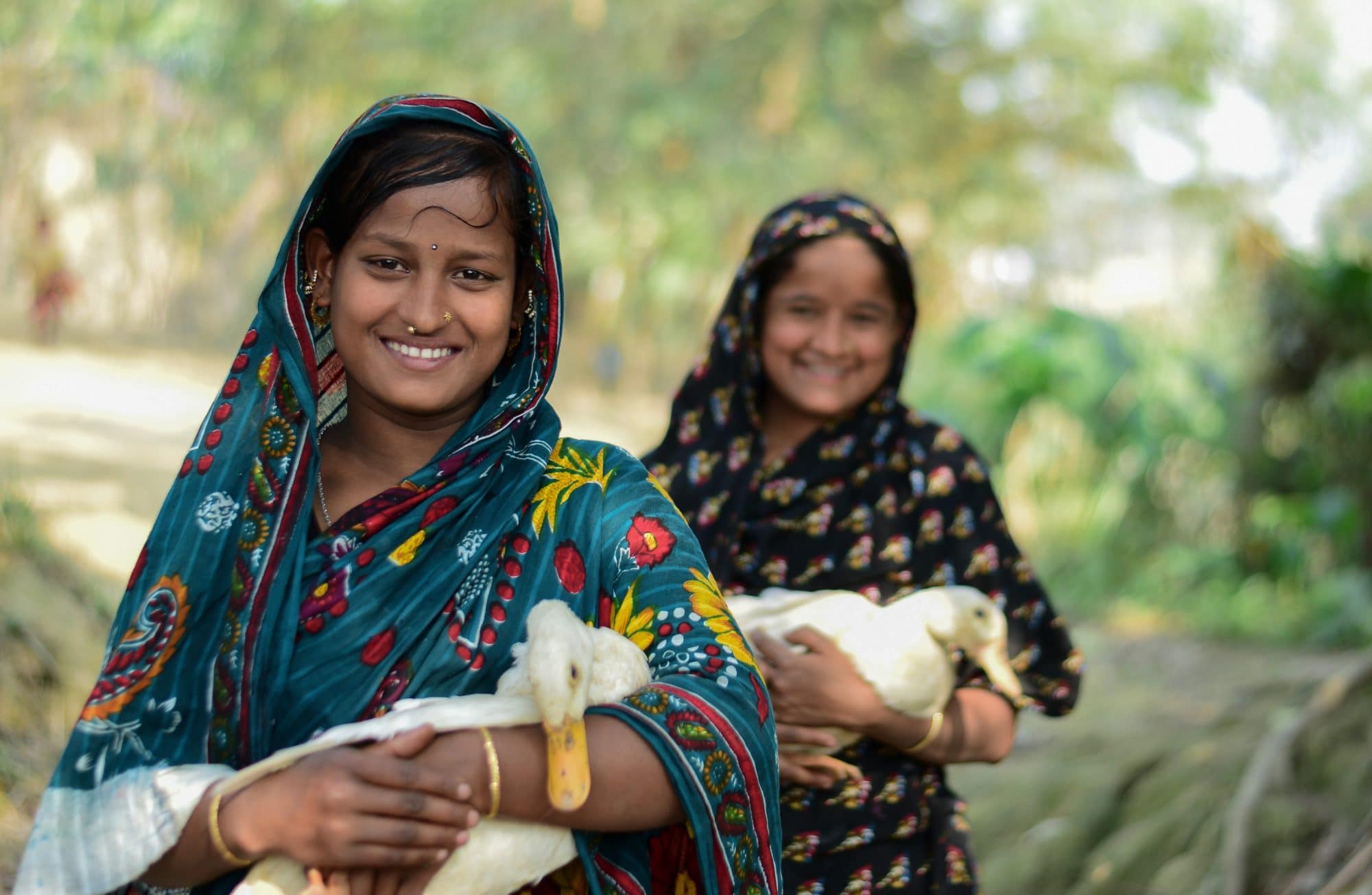Duck Rearing in the Face of Climatic Vulnerability
CARE Bangladesh: Chameli Begum’s Story of Livelihood Adaptation
Northwest Bangladesh is characterized by chronic food insecurity and an intense vulnerability to seasonal flooding. Katihara is a remote village in the district of Gaibandha in northwest Bangladesh. The village is no stranger to serious flooding and, with the reality of climate change bearing down upon it the future is likely to bring even more extreme weather. Katihara is surrounded by fertile, low-lying paddy fields and an intricate maze of waterways filled with flowering water lilies. The landscape is strikingly flat and most of the peoples’ livelihoods depend on livestock rearing and agriculture, principally growing rice, maize and potato.
For the most part, the only areas that protrude above water level are the thin, dirt pathways that snake through the village connecting adjoining crop fields. Most of the houses, built from corrugated iron and thatch, are elevated no more than a half metre above the water line. The low-lying level of infrastructure and many rivers leaves the region exceptionally vulnerable to floods and climate change, impeding agricultural productivity, shelter and settlement, as well as economic and livelihood options. For women, unequal gender power relations, including social and cultural barriers, further constrains their income and livelihood opportunities. To combat this susceptibility, CARE Bangladesh utilizes a participatory community led development initiative. This initiative is the evolving operating approach of CARE that critically analyses the underlying causes of poverty and vulnerabilities and thereby facilitates community based livelihood adaptation. It is in this village of Katihara that three women participated in a CARE Bangladesh duck hatching and rearing intervention initiated by the SHOUHARDO project.
One of these three women is Chameli Begum, 46. Like most Bangladeshi women who live in rural areas, she wears the traditional sari, often made of colourful and vividly designed cloth. It is October, nearing the end of the rainy season and Chameli has sold most of her ducks. There is little feed at this time of year, so the few ducks that remain forage for food in the nearby water bodies.
It was in 2007 that Chameli participated in duck rearing training as part of the SHOUHARDO community-led development initiative. The program taught her all the skills necessary to hatch and rear ducks. This included training on sanitation, management and marketing, as well as the right feed to provide her ducks and incubation techniques to hatch healthy ducklings. In addition, Chameli voiced that one of her greatest gains from the training was networking – she was introduced to both buyers and suppliers in the poultry value chain and met other women who were beginning their voyages into business. Chameli was also introduced to several financial institutions capable of providing her capital. All of these networks were crucial in developing her business and establishing her position within the value chain.
Prior to joining the SHOUHARDO project, Chameli’s family faced constant food shortages fuelling frequent tension within her family. Her husband, Soleman Ali, was often unable to provide livelihood security for the family, running a small business selling Gur (palm sugar) and fabric to the surrounding villages. The situation became particularly dire during Monga, an annually reoccurring cycle of poverty. During crop rotations there are inevitable periods of unemployment for large segments of the rural population who, as a result, face malnutrition and starvation. The situation is exacerbated by annual floods caused by heavy monsoonal rains and melting snow caps in the Himalayas.
The floods wreak devastation, ushering in death, disease, injury, population displacement and economic loss. This very devastation and the resulting vulnerability are what inspired Chameli to participate in the SHOUHARDO training. The flooding would prevent Chameli’s husband from traveling to nearby villages to sell his goods. Thereby, the punishing cycle of monsoonal floods caused her family repeated financial stress preventing business and often generating intense food insecurity. Now, however, supported by SHOUHARDO, Chameli and her family have built an elevated house equipped with enclosed duck pens and indoor incubators. As a result, her business remains mostly unaffected by the flooding.
Chameli’s family previously owned a few ducks, kept solely for domestic purposes. However, they were unaware of efficient rearing practices and faced scarce and poor quality locally available feed. Now, duck farming provides Chameli and her entire family with a range of benefits including the most important yet basic necessity – food security. Duck rearing has also helped to diversify the income of Chameli’s family whilst egg and duck consumption also supplement the nutritional outcomes of the family members.
SHOUHARDO initially provided Chameli with 100 ducks and feed for 10 days. In addition, Chameli is a member of the Katihara Village Development Fund, a local savings group established with support from SHOUHARDO. Chameli borrowed from the local savings group to purchase an additional 150 ducks. Since 2007, Chameli has purchased thousands of eggs every year with incubators capable of storing over 9000 eggs. With income derived from her business, Chameli purchased two dairy cows and 100 decimals (1 acre) of land where her family has since built a house equipped with incubators and several rearing areas for her ducks. With further assistance from the SHOUHARDO project, Chameli has taken out several subsequent loans from Karmoshangsthan Bank which she has reinvested into both her own duck business and the businesses of her family.
